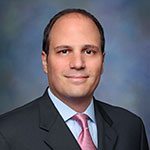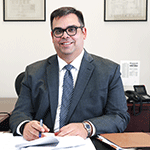Whether it was Diego Maradona’s “hand of God” goal or Jorge Ramos relaying the evening news, the old TV set in Ken Figueroa’s childhood home pumped out Spanish-language programming night after night. Figueroa, whose parents immigrated from Ecuador and Puerto Rico, was born and raised in New York. Still, his bilingual upbringing kept him connected to other parts of the world. Today, the Washington, DC-based attorney represents foreign states such as Venezuela and Ecuador before US courts and international arbitral tribunals.
His high school debate team stirred Figueroa’s interest in law. He attended Yale University (and studied in Madrid, Spain) to pursue a double major in international and Latin American studies. Two years as a corporate paralegal confirmed his growing passion, and he decided to attend Columbia Law School. There, he seized an opportunity to study abroad in Buenos Aires, Argentina. Figueroa credits the experience with revealing some fascinating nuances of the practice of law around the world. He clerked in federal court in New York, interned in Rio de Janeiro, Brazil, and picked up Portuguese language skills somewhere along the way.
“You really have to love what you do,” he says. “I’m fortunate in that I am doing exactly the kind of work I had always wanted to do.”
The pieces all came together at Cleary Gottlieb Steen & Hamilton LLP, where Figueroa worked as an associate in the firm’s Latin America division. He was spending time on corporate cases but longed to use his international and language skills more directly to make arguments. That chance serendipitously arrived when Figueroa was placed in litigation for a Mexican corporation. Suddenly, he found himself speaking Spanish to clients and translating documents while preparing the case. The litigation spun off to arbitration, and Figueroa never looked back—he started lobbying for similar assignments.
After receiving a call from a headhunter, Figueroa accepted a position at Gibson Dunn & Crutcher LLP. Two years later, he was again recruited, this time to Foley Hoag, a global firm whose international litigation and arbitration department specializes in investor-state matters—claims by foreign investors against the states in which they do business. Figueroa helps manage multilingual teams and high- profile, high-dollar cases around the world.
Based in Boston with offices in Washington, DC and Paris, Foley Hoag is reliant on international arbitration. Many of Figueroa’s cases involve mining and related industries and often deal with claimants who are dissatisfied with court orders and regulations. Other key issues include environmental affairs and allegations of expropriation.
Notable cases include the defense of a Latin American country in an International Centre for Settlement of Investment Disputes proceeding. The case, brought by a Canadian company defending a state-owned petroleum company, regarded a breach of contract claim in an oil recovery project and defense for a Mexican rubber company in numerous courts for antitrust matters. Figueroa has also represented major banks, corporations, and senior officers in complex contract matters, licensing disputes, alleged criminal conduct, and bribery scandals. Dollar values of such cases often reach into the billions.
As partner, he helps develop the practice further in terms of client acquisition, business development, and reputation. That means traveling in Latin America and arranging introductions or presenting information about the cases the firm leads or carries.
Figueroa’s practice group employs attorneys of diverse backgrounds. “A second language is not just useful, it’s almost a requirement,” he says. Attorneys need to be fluent enough to review documents, communicate with officials, and interact with witnesses. Several of his hearings, arguments, and cross-examinations are conducted in Spanish, French, Portuguese, and other languages.
Since international arbitration is a global community with centers around the world in cities such as Paris, London, and Madrid, Figueroa is often on a plane. He says international lawyers need to be comfortable traveling abroad and knowledgeable of foreign events. “What’s happening on the ground matters, so you have to keep up with civil law and current events,” he says, adding that it’s imperative to appreciate local cultures and customs. Keeping up is a challenge, but Figueroa does his best to scan international newspapers and follow changing rules and regulations.
When it comes to building the skills necessary for success, Figueroa says aspiring lawyers should keep an open mind and develop cross-cultural competencies. What is most important he says, is maintaining a passion for one’s work. “This can be very hard work with a lot of travel and long hours. You really have to love what you do,” he says. “I’m fortunate in that I am doing exactly the kind of work I had always wanted to do.”

